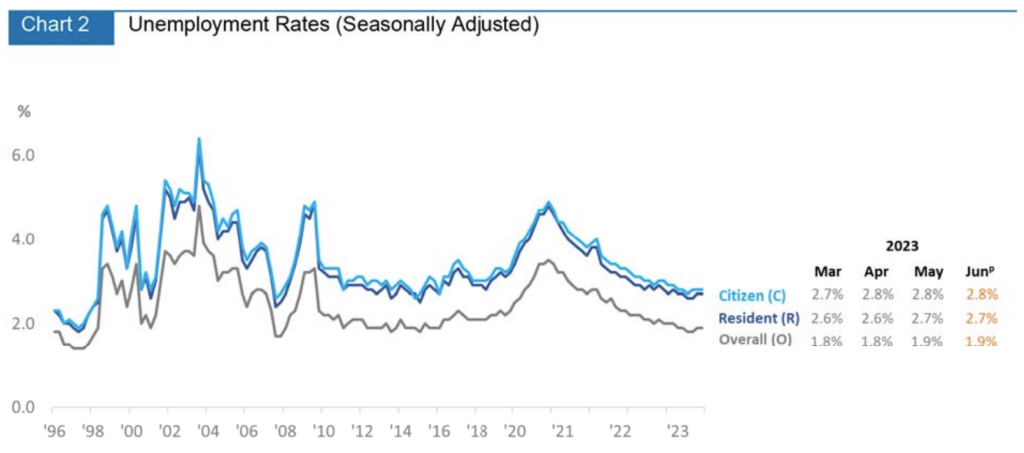Global hiring platform Indeed has released a new set of figures about selected labour markets in Asia, including Singapore, evaluating the employment situation towards the end of 2023.
Besides the city-state, it includes Hong Kong, Japan, Malaysia and the Philippines — though that last addition is arguably the least relevant for a qualitative comparison due to a significant gap in development between it and other economies.
Still, the averages presented by Indeed should remain relevant and they reveal major advantages in the types of jobs found in Singapore versus not only neighbouring Malaysia (which is understandable), but also Japan, and its most direct competitor, Hong Kong.
Hiring slows down
We’re clearly out of the pandemic ripples tearing through the job market, as unemployment in Singapore reached pre-pandemic levels of around two per cent and appears to have stabilised.

It is therefore no surprise that the number of job offers has also declined slightly in tandem with economy reaching equilibrium again, as per Indeed’s data:
Some professions, it has to be said, have been hurt more than others at this tail-end of the Covid-19 disruptions, with listings in some professions decreasing by up to 20 to 25 per cent over the three-month period until July 31.
Is there a doctor on board?
At the same time, there’s been a significant jump in openings for all sorts of jobs in the medical sector — from physicians and surgeons, through veterinarians and pharmacists, to medical technicians, each increasing in the range of 20 to 30 per cent since April:
Overall, as many menial, blue-collar professions have filled their post-Covid gaps, the city is yet again looking for more workers at the top end of the labour market, despite an overall decrease in vacancies.
Quality trumps quantity
According to Indeed, 9.7 per cent of postings in Singapore are in software development versus just 5.4 per cent in other countries, which is a gap of +4.4 percentage points after rounding.
The largest positive gap is in management at +5.8 percentage points, followed by other white-collar jobs in science, design, project management, industrial engineering or banking & finance, underscoring Singapore’s status as a business & tech hub.
Conversely, relatively the fewest jobs are offered in retail (-6.6 p.p.), food preparation & service (-2.8 p.p.), personal care & home health (-1.7 p.p.) and others, listed in the table below:
Overall, there are two angles to interpret the data above.
Firstly, a more pessimistic one, recognises that in the face of a likely economic slowdown. This year’s GDP growth in Singapore is expected to come in at just around one per cent, according to the Monetary Authority of Singapore’s survey of the private sector economists, as inflation continues to erode nominal increase in economic output. It should, therefore, be no surprise that hiring numbers are not quite as high.
On the other hand, an optimist would point out that employment in Singapore has increased by about 175,000 compared to its pre-pandemic peak in 2019, while resident labour force has grown by 110,000 in the same time — while quality openings remain available at higher rates than in other developed Asian economies.
This is no small feat considering the sweeping impact of Covid-19, followed by a wave of record inflation amplified by reckless Russian invasion of Ukraine a year and a half ago.
Featured Image Credit: Shutterstock